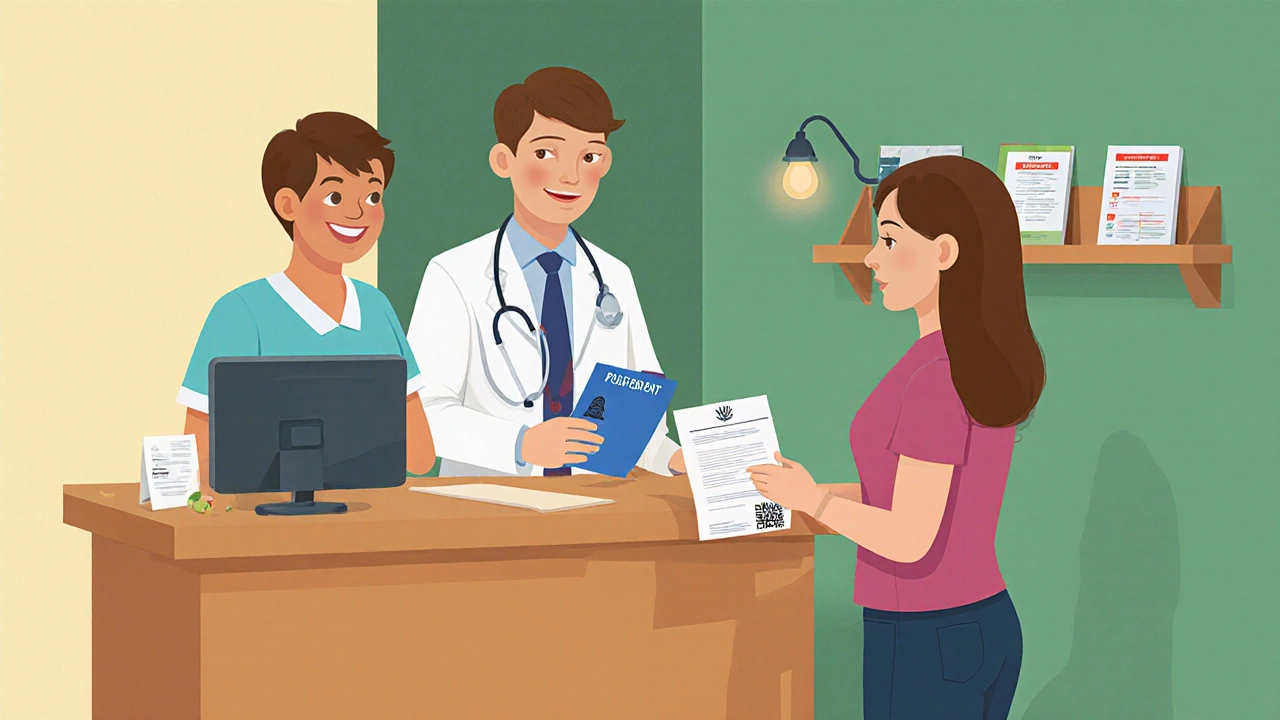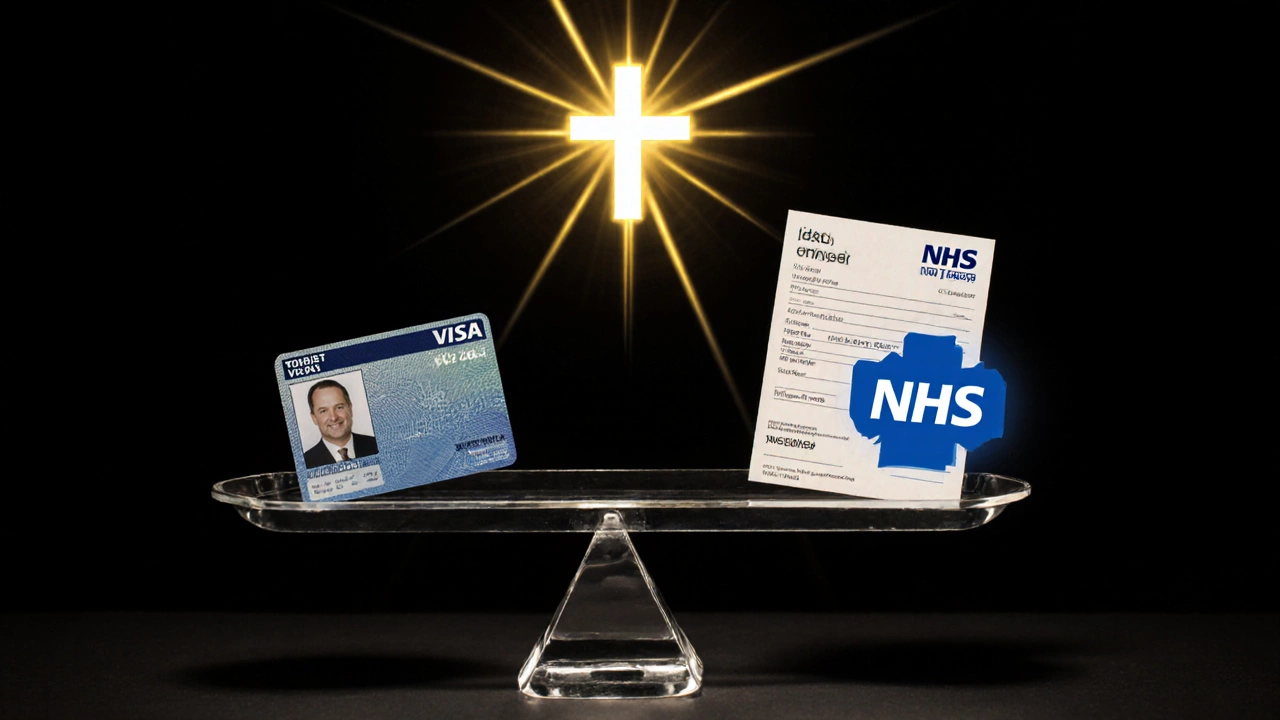NHS Healthcare Eligibility Checker
Check Your NHS Eligibility
This tool helps determine if you're eligible for free NHS healthcare based on UK residency rules. Your eligibility depends on your residence status, not just the amount of time you've lived here.
You must be ordinarily resident to qualify—meaning you're living here lawfully for settled purposes, not temporarily.
Many people move to the UK thinking healthcare is free right away-like a welcome gift. But that’s not how it works. The NHS isn’t automatic. You don’t get full access the moment your plane lands. So how long do you actually have to be in the UK to get free healthcare? The answer isn’t simple, but it’s clear once you know the rules.
You’re Eligible if You’re ‘Ordinarily Resident’
The key term isn’t ‘citizen’ or ‘visa type’-it’s ordinarily resident. That means you live in the UK lawfully, voluntarily, and for settled purposes as part of your regular life. It’s not about how many days you’ve counted. It’s about your intent.
Let’s say you move from Spain to London for a job. You rent a flat, open a UK bank account, your kids start school, and you stop paying Spanish taxes. That’s ordinary residence. You’re eligible for free NHS care from day one-even if you’ve only been here three weeks.
On the flip side, someone on a 3-month tourist visa isn’t ordinarily resident, even if they stay for 89 days. They can’t get free hospital treatment (except emergencies), and they’ll be billed for anything beyond urgent care.
What Counts as ‘Free’ Healthcare?
Free NHS care includes GP visits, hospital treatment, maternity care, mental health services, and emergency care. But not everything is free. Prescription charges apply in England (unless you qualify for an exemption). Dental care and eye tests have set fees too. These aren’t hidden costs-they’re clearly listed on the NHS website.
People often confuse ‘free at the point of use’ with ‘completely free.’ It’s not. The NHS is funded by taxes. If you’re working and paying UK taxes-or your employer is-you’re contributing to the system. That’s why residency matters more than nationality.
Visa Types and Healthcare Access
Your visa doesn’t automatically grant you NHS access, but it often determines whether you’ll pay the Immigration Health Surcharge (IHS).
If you’re on a work visa, student visa, or family visa lasting more than 6 months, you pay the IHS when you apply. It’s currently £776 per year (as of 2025). Once you pay it, you get the same NHS access as a UK citizen-no extra charges for hospital visits or GP appointments.
But if you’re on a short-term visa (like a visitor or business visa), you don’t pay the IHS. And you’re not covered. If you need non-emergency care, you’ll be charged 150% of the NHS cost. That’s how the system prevents abuse.
There are exceptions. People from countries with reciprocal healthcare agreements (like EU nations, Australia, New Zealand, and others) can get free treatment for certain conditions if they’re visiting temporarily. But this doesn’t apply to long-term stays.

What About Asylum Seekers and Refugees?
Asylum seekers are entitled to full NHS care from the moment they apply for asylum. They don’t pay anything-not even for prescriptions. That’s a legal requirement under UK and international law.
Refugees get the same access as UK residents once granted status. They’re considered ordinarily resident and can register with a GP immediately. No waiting period. No extra fees.
Undocumented migrants are a gray area. They’re entitled to emergency treatment and certain public health services like maternity care and treatment for infectious diseases. But they’re charged for everything else. Hospitals are required to check eligibility before non-urgent care, but they can’t refuse life-saving treatment.
How Do You Register With a GP?
Even if you’re eligible, you still need to register with a GP surgery. It’s not automatic. You can’t just walk into a hospital and say, ‘I’m here for free care.’
To register, you need proof you live in the area. That could be a rental agreement, utility bill, bank statement, or letter from your employer. Some surgeries ask for your visa or biometric residence permit if you’re not a UK citizen.
Don’t wait until you’re sick. Register as soon as you settle. If you don’t, you might be turned away from non-emergency care or charged incorrectly.
What If You’re Not Eligible?
If you’re not ordinarily resident and you don’t pay the IHS, you’re not covered. That doesn’t mean you’re left without options.
You can buy private health insurance. Many expats do. It gives you faster access, private rooms, and coverage for things the NHS doesn’t always handle quickly-like physiotherapy or specialist consultations.
Some employers offer private healthcare as part of a benefits package. If you’re moving for work, check your contract. It might cover more than you think.
And if you’re here temporarily, travel insurance with medical coverage is a must. The UK isn’t cheap for medical tourists. A single hospital stay without insurance can cost over £5,000.

Common Mistakes People Make
Many people assume:
- Having a UK address = automatic NHS access (it doesn’t)
- Being married to a UK citizen = free care (nope-your own residency status matters)
- Being on a visa for 6 months means you’re covered (you need to pay the IHS first)
- Emergency care is always free (it is-but non-emergency isn’t)
One woman from the US moved to Manchester for a teaching job. She waited three months to register with a GP, thinking she could just go to A&E if anything came up. When she needed a knee scan, she was charged £1,200 because she hadn’t registered. She didn’t know she’d already paid for it through her IHS-she just hadn’t linked it to her GP.
Don’t be that person. Register early. Ask questions. Don’t assume.
How to Check Your Status
The NHS has a simple online tool to help you check your eligibility: NHS Overseas Visitors Eligibility Checker. You don’t need to log in. Just answer a few questions about your visa, purpose of stay, and length of time.
If you’re unsure, call the NHS Overseas Visitors Team on 0300 330 1111. They can walk you through your situation. No judgment. No pressure. Just facts.
Or visit your local GP surgery. They’re used to helping people navigate this. Bring your documents. Ask, ‘Am I eligible for free NHS care?’ That’s the right question to ask.
Bottom Line
You don’t need to wait months or years to get free healthcare in the UK. If you’re living here lawfully and regularly-whether you’re a student, worker, or refugee-you’re eligible from day one. The system isn’t about time spent. It’s about legal, settled residence.
Pay the IHS if your visa requires it. Register with a GP as soon as you can. Keep your documents handy. And don’t assume anything.
The NHS is one of the most valuable public services in the world. But it’s not a tourist attraction. It’s a system built for people who make the UK their home. If you’re one of them, you’re covered. If you’re not, you need to plan ahead.





